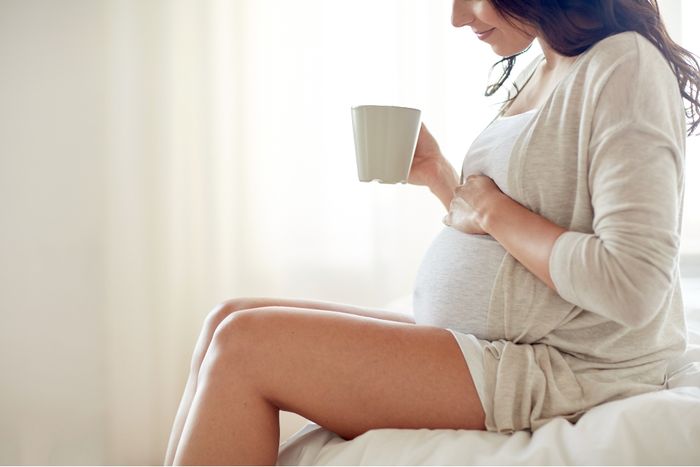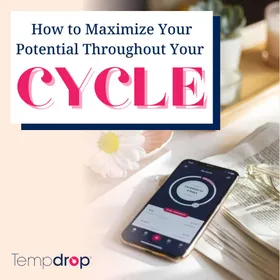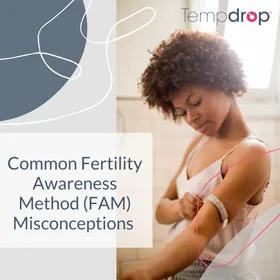10 Fertility Myths Debunked: Separating Fact from Myth
Kick fertility myths to the curb
Updated March 11, 2025.

You may have heard some myths about getting pregnant, such as how certain foods can impact your chances of conception, but some hold little to no proof, whereas others have some merit.
To help you navigate some of the most common fertility myths, we spoke to holistic fertility and hormone coach and pre- and post-natal coach, Lisa Cartier, for her insights on the matter.
1. Caffeine and Pregnancy
The acceptable caffeine amount is 400 mg a day, and that includes foods that contains any. But with pregnancy, it takes the body longer to metabolize caffeine. So if you're consuming the same amount of caffeine during pregnancy, it means that it's staying longer in your body and can be passed through your placenta to your baby.
"I don't generally tell people to avoid caffeine because sometimes that in itself is very hard and challenging. And if they switch over to decaffeinated, they should consider how it's being decaffeinated. If it's chemically decaffeinated, that's even more detrimental to your body and the baby's body than having the regular caffeine," explains Cartier.
Tip: When you're pregnant, especially in the early stages, pay attention to how much caffeine you're consuming. If you need to have it, have a cup or half a cup in the morning or at any time during the day, but avoid overconsumption.
2. Papayas and Miscarriages
There has been speculation regarding the potential of unripe papaya to cause miscarriages. However, the scientific evidence supporting this claim is limited. That being said, unripe papayas contain latex, which potentially could be harmful.
A study conducted on pregnant rats demonstrated that consuming unripe papaya led to early contractions. Therefore, the effects may vary from person to person.
3. Pineapples and Fertility
On the nutritional side, pineapple has been associated with fertility due to its content of bromelains, a group of enzymes. These bromelains are believed to have properties that can boost fertility, such as reducing inflammation and aiding in blood thinning, which can be beneficial for individuals with clotting issues.
The highest concentration of bromelains is found in the core of the fruit, making it the preferred part to consume compared to the whole pineapple.
"Consuming pineapple before and after implantation is said to be beneficial for the process of healthy implantation, as it helps with inflammation, which is crucial for conceiving."
If consuming pineapple makes you feel good and you believe it helps, it may be worth trying. However, it's also important to assess the overall inflammation in your body before consumption as it can impact fertility.
» Want to know more? Find out the best foods to boost libido during ovulation
4. Irregular Cycles and Infertility
Usually, irregular cycles occur when you're ovulating late, or in some cases you may not be ovulating at all. Does this mean you're infertile even when you do have a period? This depends. To have a true period you need to ovulate. Ovulation is when you release an egg. Estrogen signals the body to release the egg, after the egg is released Progesterone rises. If the egg isn't fertilized, progesterone production stops and the uterine lining is shed, causing you to have your period.
However, if you're not ovulating (not releasing an egg) then you are not fertile. But just because you are ovulating less regularly, does not mean that you are infertile.
Tip: Tracking your full cycle and paying attention to signs like LH surges, cervical mucus and BBT changes can help determine the times when you are and aren't fertile.
5. Morning Sex for Pregnancy
If the male has had a good night's sleep, then his sperm is typically more fertile because, while sleeping, the body regenerates the sperm from that day. So if they aren't getting adequate sleep, then morning time isn't going to matter because the sperm isn't able to regenerate in a healthy way.
However, with solid sleep, in the morning, he's ready to go since, in the daytime, there could be things that influence sperm quality. Some examples include:
- If he's been in a hot tub
- If he's been bike riding
The heat that his body has been through will compromise, to a degree, what is happening with the sperm.
Can Certain Sex Positions Increase Chances of Conception?
The position during intercourse does not determine the likelihood of conception, and it varies from person to person. The key is to prioritize the comfort, health, and well-being of both partners. A relaxed state of mind plays a significant role in the process.
Engaging in activities that do not feel good can create obstacles. Deep penetration is essential regardless of the circumstances since it helps bring the sperm closer to the cervix, which is the ultimate goal.
6. Sex Every Day Boosts Chances of Conception
The timing of intercourse has more to do with your 'fertility window' than anything. Obviously, if you're having sex more times during that fertility window, you have more of a chance of conceiving.
"You don't want to get to the point where you're extremely fatigued and tired. But I would say intercourse more than once during your fertility window would probably be the most helpful. Do you have to have it every day? No. If you have it every day, is that going to be bad? It really depends on you."
Tip: If possible, take at least three months to a year prior to when you actively want to conceive and really look at your (and your partner's) overall health, including lifestyle choices, gut health, blood sugar, and stress levels.
Work with those factors so that when you do decide to conceive, you have a really good conception plan.
» Check out this guide to when you are most fertile
7. Size Matters When Trying To Get Pregnant
The biggest thing is the sperm getting to the cervix, not the penis size. Putting definitive ideas that size impacts conception chances or sperm validity can add so much more stress to the whole situation when it's so unnecessary.
Cartier adds, "If the sperm can do its job, size doesn't matter."
8. You Can Plan Baby's Gender
"Based on my experience with clients, I suggest tracking your ovulation and paying attention to your fertility window. This is because your vaginal pH changes during ovulation, which some believe can influence the gender of the baby."
- To conceive a female: "I suggest you have sex further out from ovulation," says Cartier. This way, the sperm remains in an environment with a different pH level. When ovulation occurs, the pH level doesn't change, potentially increasing the chances of conceiving a girl. Note: Sperm can live for five to six days.
- To conceive a male: Having sex closer to ovulation, at the end of the fertile window, may increase the likelihood of conceiving a male baby since the conditions closer to ovulation may be more favorable for Y-bearing sperm.
There isn't a guaranteed 100% success rate with this method and it's not scientifically proven, but it's the only suggestion Cartier found to hold any value based on her experiences.
» Discover more about fertility charting
9. Arousal Fluid Helps Conception
Arousal fluid is a clear discharge that can occur throughout your cycle but typically secretes when sexually stimulated or while having sex. This fluid can help with conception as it creates a more suitable environment for sperm, which can potentially boost the chances of conception.
However, cervical mucus is more essential for conception. Factors such as healthy nutrition and weight, as well as reduced stress, can help stimulate better cervical mucus and arousal fluid production.
10. Egg-Freezing Guarantees Conception
Some common myths surrounding this are that if you freeze your eggs, you're guaranteed to have a baby. However, since many women respond to the egg retrieval process differently and egg quality and quantity can differ, there is no definitive assurance that you'll be able to have a child.
Moreover, some may fear there are fewer eggs for later if you freeze them sooner. AMH testing helps rule out any uncertainty for women hoping to use their eggs at a later stage. However, you can improve your AMH levels through factors like a healthy diet, adequate sleep, and more.
Debunk The Myths and Track Your Fertility
Instead of looking at misinformation, focus on things that are supported and work with someone who has a good foundation for explaining what is happening in your body. "I don't recommend doing it on your own because everyone is different. Each situation is unique and requires personalized attention," says Cartier.
Tracking is incredibly important as it allows you to understand when things are changing and when they are not. With Tempdrop, this can be easy, too. Tempdrop's fertility tracker uses your basal body temperature (BBT) alongside other key fertility indicators to monitor your cycle and identify your fertile window and to confirm ovulation.





